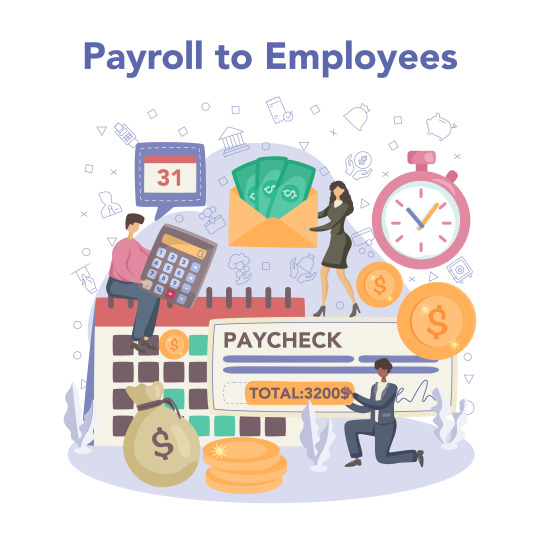Don't wanna be here? Send us removal request.
Text
Why Is Tax Service Important to Us?

In today's fast-paced world, tax services play a crucial role in managing personal and business finances. Navigating through tax laws, deductions, and filings can be overwhelming, which is why having a professional handle these processes is invaluable. Let's explore why tax services are indispensable and how they contribute to financial well-being.
Understanding the Complexity of Tax Laws
Tax laws are notoriously complex, and they evolve constantly. Staying updated on every new tax regulation and understanding how it affects you or your business requires a significant investment of time and expertise. Professionals in the tax service industry ensure compliance with these laws, minimizing risks associated with penalties or audits.
These experts are well-versed in the latest tax codes and regulatory changes, enabling them to apply the most advantageous strategies to reduce your tax liability. Whether it's understanding intricate provisions, maximizing deductions, or planning for long-term tax savings, a professional service is essential for smooth tax compliance.
Ensuring Accurate Filings and Compliance
Mistakes in tax filings can lead to severe consequences such as hefty fines, penalties, or even legal issues. Tax professionals reduce these risks by ensuring that every detail of your tax return is accurate and compliant with local, state, and federal tax requirements. This is particularly critical for businesses, where tax errors can damage financial stability.
Moreover, tax service providers have specialized software and tools that can automate many parts of the filing process, increasing accuracy and saving time. When handled by professionals, you can trust that your taxes are filed correctly, giving you peace of mind.
Maximizing Tax Deductions and Credits
One of the most significant benefits of hiring a tax service is their ability to identify deductions and credits you may not be aware of. For individuals, this could mean qualifying for deductions on education, mortgage interest, or charitable contributions. For businesses, it could mean recognizing depreciation, operating expenses, and employee-related credits that could significantly lower taxable income.
Professionals are trained to maximize these benefits, ensuring that no opportunity is missed to reduce your tax burden. They understand the nuances of different types of deductions and can tailor strategies to your specific situation.
Strategic Tax Planning for the Future
Tax services go beyond annual filings—they offer strategic planning that can optimize your financial standing in the long term. By working with tax professionals, you can develop tax-efficient strategies for retirement planning, estate transfers, and business succession. They can help you forecast future tax liabilities and advise on investments, charitable donations, and asset transfers that align with your financial goals while minimizing tax exposure.
For businesses, tax planning is integral to operations, especially when expanding, merging, or investing. A good tax plan aligns with broader financial strategies, ensuring that tax implications are factored into every major decision.
Saving Time and Reducing Stress
Tax season is often associated with stress, especially when managing multiple documents, receipts, and forms. By hiring a tax service, you save valuable time that can be better spent on your personal life or business operations. Professionals take the burden off your shoulders by handling the intricate details of tax preparation and filing.
This efficiency is particularly important for business owners, who can focus on running their companies without being bogged down by tax-related responsibilities. In many cases, the time saved alone justifies the investment in professional services.
Protection During Audits
An audit can be a daunting experience, but having a tax professional by your side provides a significant advantage. In the event of an audit, they can represent you, ensuring that the process is handled smoothly and efficiently. They are trained to deal with the IRS or other tax authorities, reducing the stress and potential errors that could arise from handling it on your own.
Not only do tax service providers help you prepare for the possibility of an audit, but they can also act as your advocate. This includes responding to IRS inquiries, gathering necessary documentation, and offering advice on how to proceed.
Tailored Services for Individuals and Businesses
Different taxpayers have different needs, and tax services offer tailored solutions to meet those unique requirements. Whether you're an individual with relatively simple tax needs or a large business with complex financial structures, tax professionals can adapt their services accordingly.
For individuals, this may include navigating complex life changes like marriage, divorce, buying property, or inheritance. For businesses, tax services encompass payroll tax, sales tax, international tax, and more. This versatility ensures that you're getting the exact service you need, no matter your situation.
Minimizing Risks and Penalties
Errors in tax filings can result in costly penalties and interest charges. Even honest mistakes, such as incorrect calculations or missed deadlines, can lead to financial setbacks. A professional tax service can help you avoid these pitfalls by ensuring that your tax return is filed correctly and on time.
Moreover, in the case of tax underpayments or disputes, tax professionals can negotiate with tax authorities on your behalf, helping to resolve issues in a way that minimizes financial damage.
Access to Expert Advice Year-Round
Many people mistakenly assume that tax services are only necessary during the tax season. However, these professionals are valuable resources throughout the year. They offer advice on tax-efficient investment strategies, updates on changing tax laws, and recommendations on how to adjust financial decisions to reduce tax burdens.
Whether you're considering a large purchase, selling assets, or planning for retirement, tax service providers can give you the guidance you need to make informed decisions that have positive tax implications.
The Bottom Line: Tax Services Are an Investment in Your Financial Future
Hiring a tax service is not just about filing a tax return—it's about investing in your financial health. By ensuring compliance, maximizing deductions, offering strategic advice, and protecting against audits, professional tax services can save you time, money, and stress. They offer peace of mind and a tailored approach that fits your unique financial situation, ensuring you get the most out of your tax filings.
0 notes
Text
The Essential Functions of Corporate Advisory Services

Corporate advisory services play a crucial role in helping businesses navigate complex financial and strategic challenges. Whether you're a small startup or an established corporation, these services provide the expertise needed to make informed decisions and achieve long-term success.
What Are Corporate Advisory Services?
Corporate advisory services encompass a range of professional consulting services designed to support businesses in various aspects of their operations. These services are typically provided by experienced advisors who specialize in areas such as finance, strategy, mergers and acquisitions, and corporate restructuring.
Key Functions of Corporate Advisory Services
Strategic Planning and Analysis
One of the primary functions of corporate advisory services is to assist businesses in developing and implementing effective strategies. Advisors work closely with management teams to analyze market trends, identify growth opportunities, and create actionable plans that align with the company’s goals. This strategic guidance is essential for businesses looking to expand, enter new markets, or improve their competitive position.
Financial Advisory and Risk Management
Corporate advisors also provide critical financial advice, helping businesses manage their finances more effectively. This includes everything from financial planning and budgeting to risk management and investment strategies. By offering insights into market conditions and financial trends, advisors enable companies to make sound financial decisions that enhance profitability and reduce risk.
Mergers and Acquisitions (M&A)
In the world of mergers and acquisitions, corporate advisory services are indispensable. Advisors help businesses identify potential acquisition targets, conduct due diligence, and negotiate deals. They also assist in the integration process, ensuring that the newly merged entities operate smoothly and achieve the desired synergies. This expertise is vital for companies looking to grow through acquisitions or divest non-core assets.
Corporate Restructuring and Turnaround Management
When a company faces financial distress or operational challenges, corporate advisory services can be the key to turning things around. Advisors work with management to develop restructuring plans that may involve cost-cutting, refinancing, or even reorganization of the business. Their goal is to stabilize the company’s operations and put it on a path to recovery, ensuring long-term sustainability.
Capital Raising and Investor Relations
Another important function of corporate advisory services is assisting businesses in raising capital. Whether it's through debt financing, equity investment, or other means, advisors help companies secure the necessary funds to support growth and expansion. They also play a role in managing investor relations, ensuring that stakeholders are kept informed and engaged.
Why Businesses Need Corporate Advisory Services
Corporate advisory services provide businesses with access to specialized knowledge and expertise that may not be available in-house. This external perspective is invaluable when making critical decisions that can impact the future of the company. Additionally, advisors bring a wealth of experience from working with different industries and markets, offering insights that can lead to better outcomes.
Conclusion
In today’s competitive business environment, corporate advisory services are more important than ever. They offer the strategic guidance, financial expertise, and operational support that businesses need to thrive. Whether you're navigating a merger, restructuring your operations, or planning for future growth, the right corporate advisor can make all the difference in achieving your business objectives.
0 notes
Text
Understanding the Role of a Corporate Adviser

Corporate advisers play a crucial role in the business world. They provide expert advice to companies on various aspects of their operations. This guidance is essential for businesses aiming to grow and succeed.
Key Responsibilities of Corporate Advisers
Corporate advisers are responsible for analyzing company performance. They assess financial statements, market trends, and business strategies. This analysis helps identify strengths and weaknesses.
Strategic Planning and Implementation
A significant part of a Corporate Advisory job involves strategic planning. They help companies develop long-term goals and actionable plans. Advisers also ensure these plans are effectively implemented.
Financial Management and Investment Guidance
Corporate advisers offer financial management services. They guide companies on budgeting, investment opportunities, and risk management. Their advice is crucial for making informed financial decisions.
Market Analysis and Competitive Strategy
Understanding market dynamics is another key area. Corporate advisers conduct thorough market analysis. They help businesses understand their competitive landscape and develop strategies to stay ahead.
Mergers and Acquisitions
Corporate advisers often assist with mergers and acquisitions. They provide insights on potential deals, conduct due diligence, and negotiate terms. This expertise is vital for successful business expansions.
Regulatory Compliance and Risk Management
Ensuring regulatory compliance is critical for businesses. Corporate advisers help companies adhere to laws and regulations. They also identify potential risks and develop mitigation strategies.
Enhancing Operational Efficiency
Improving operational efficiency is another focus area. Corporate advisers analyze business processes and recommend improvements. This leads to cost reduction and increased productivity.
Building and Maintaining Relationships
Corporate advisers play a key role in stakeholder management. They help build and maintain relationships with investors, clients, and partners. Strong relationships are essential for business success.
Conclusion
Corporate advisers are invaluable to businesses. Their expertise helps companies navigate challenges and seize opportunities. By providing strategic guidance and support, they contribute significantly to business growth and success.
0 notes
Text
Corporate Advisory: Comprehensive Guide for Businesses

Corporate advisory refers to the range of services provided to businesses to help them achieve their financial, strategic, and operational goals. These services encompass financial planning, risk management, business restructuring, mergers and acquisitions, and more. Corporate advisors offer expert guidance to enhance decision-making and ensure sustainable growth.
Importance in the Business Landscape
In the complex and fast-paced business environment, having access to professional advisory services is crucial. Corporate advisors help companies navigate challenges, capitalize on opportunities, and maintain a competitive edge. Their insights and strategies are invaluable for both startups and established corporations looking to optimize their operations and financial performance.
Types and Categories of Corporate Advisory Services
Financial Advisory
Financial advisory services include financial planning, budgeting, forecasting, and investment management. These services aim to enhance a company's financial health and ensure long-term stability.
Management Consulting
Management consulting focuses on improving organizational performance through strategic planning, process optimization, and leadership development. Consultants work closely with management teams to implement effective business strategies.
Risk Advisory
Risk advisory services help businesses identify, assess, and mitigate risks. This includes financial, operational, regulatory, and reputational risks. Advisors develop risk management frameworks to safeguard the company's assets and reputation.
Transaction Services
Transaction services encompass advisory support for mergers, acquisitions, divestitures, and capital raising. Advisors provide due diligence, valuation, and integration support to ensure successful transactions.
Core Functions of Corporate Advisory
Strategic Planning
Strategic planning involves setting long-term goals and developing plans to achieve them. Advisors help businesses create and implement strategies that align with their vision and market conditions.
Business Restructuring
Business restructuring aims to improve financial stability and operational efficiency. This can involve reorganizing the company's structure, operations, or finances to address challenges and enhance performance.
Financial Planning and Analysis
Financial planning and analysis (FP&A) services provide insights into a company's financial performance and future outlook. Advisors assist with budgeting, forecasting, and financial reporting.
Mergers and Acquisitions (M&A)
M&A services include identifying potential targets, conducting due diligence, negotiating terms, and integrating acquired businesses. Advisors ensure that transactions are strategically beneficial and financially sound.
Due Diligence
Due diligence is a critical component of M&A and investment decisions. Advisors conduct thorough investigations to assess the financial, legal, and operational aspects of a target company.
Capital Raising
Capital raising involves securing funding for business expansion, acquisitions, or other strategic initiatives. Advisors help businesses identify funding sources, prepare financial projections, and negotiate terms with investors.
Risk Management
Risk management services focus on identifying and mitigating potential threats to the business. Advisors develop risk management frameworks and implement measures to protect the company's interests.
Key Players in Corporate Advisory
Major Firms
Large multinational firms such as Deloitte, PwC, EY, and KPMG dominate the corporate advisory market. These firms offer a wide range of services and have extensive resources and expertise.
Boutique Advisory Firms
Boutique firms specialize in specific areas of corporate advisory, such as M&A or risk management. They offer personalized services and often have deep industry knowledge.
In-House Advisors
Some companies employ in-house advisors to provide ongoing strategic and financial guidance. These advisors have a deep understanding of the company's operations and culture.
Benefits of Corporate Advisory Services
Improved Strategic Decisions
Corporate advisors provide expert insights that help businesses make informed strategic decisions. Their objective analysis and recommendations lead to better outcomes and sustainable growth.
Enhanced Financial Performance
Advisory services improve financial planning, budgeting, and investment decisions, leading to enhanced financial performance and profitability.
Risk Mitigation
Advisors help businesses identify and manage risks, reducing the likelihood of financial losses and operational disruptions.
Access to Expert Knowledge
Businesses benefit from the specialized knowledge and experience of corporate advisors, gaining access to best practices and innovative solutions.
Challenges in Corporate Advisory
Market Volatility
Advisors must navigate market volatility and economic uncertainty, which can impact their recommendations and the success of their strategies.
Regulatory Changes
Constantly evolving regulations pose challenges for advisors who must ensure that their clients remain compliant with legal requirements.
Internal Resistance
Implementing advisory recommendations can face resistance from within the organization, particularly if they involve significant changes to existing processes.
Ethical Considerations
Advisors must adhere to high ethical standards and avoid conflicts of interest to maintain their integrity and the trust of their clients.
The Process of Corporate Advisory
Initial Assessment
Advisors begin with a comprehensive assessment of the client's business, including financial performance, market position, and internal processes.
Strategic Development
Based on the assessment, advisors develop tailored strategies to address the client's specific needs and objectives.
Implementation and Monitoring
Advisors assist with the implementation of strategies and monitor progress to ensure that goals are being met.
Evaluation and Adjustment
Regular evaluations are conducted to assess the effectiveness of the strategies and make necessary adjustments to stay on track.
Tools and Methodologies in Corporate Advisory
Financial Modeling
Financial modeling involves creating detailed financial projections to evaluate the potential impact of strategic decisions.
SWOT Analysis
SWOT analysis assesses the company's strengths, weaknesses, opportunities, and threats to inform strategic planning.
PESTLE Analysis
PESTLE analysis examines the external factors (Political, Economic, Social, Technological, Legal, Environmental) that can impact the business.
Balanced Scorecard
The balanced scorecard is a performance management tool that helps businesses track and achieve their strategic goals.
Corporate Advisory in Different Sectors
Technology
Advisors in the technology sector help businesses navigate rapid innovation, regulatory challenges, and market competition.
Healthcare
In the healthcare sector, advisors focus on regulatory compliance, cost management, and improving patient outcomes.
Manufacturing
Manufacturing advisors assist with process optimization, supply chain management, and technological adoption to enhance efficiency and competitiveness.
Financial Services
Advisors in financial services provide risk management, regulatory compliance, and strategic planning to ensure stability and growth.
Case Studies and Real-Life Applications
Successful Turnarounds
Case studies of companies that have successfully turned around their fortunes through strategic advisory support.
Mergers and Acquisitions
Examples of successful M&A transactions facilitated by corporate advisory firms, highlighting the benefits and challenges.
Risk Management Scenarios
Real-life scenarios where effective risk management strategies have protected businesses from significant threats.
Trends in Corporate Advisory
Digital Transformation
Advisors are increasingly focusing on digital transformation to help businesses leverage new technologies for growth and efficiency.
ESG (Environmental, Social, Governance) Focus
There is a growing emphasis on ESG considerations, with advisors helping businesses integrate sustainability into their strategies.
Globalization and Cross-Border Advisory
Advisors are addressing the complexities of globalization, providing cross-border advisory services to help businesses expand internationally.
Use of AI and Big Data
The adoption of AI and big data analytics is transforming corporate advisory, enabling more accurate and efficient decision-making.
Future of Corporate Advisory
Predictions and Outlook
The future of corporate advisory will be shaped by technological advancements, regulatory changes, and evolving market dynamics.
The Evolving Role of Advisors
Advisors will play an increasingly strategic role, providing holistic guidance that encompasses financial, operational, and technological aspects.
Impact of Emerging Technologies
Emerging technologies such as AI, blockchain, and IoT will continue to disrupt the corporate advisory landscape, offering new opportunities and challenges.
Choosing the Right Corporate Advisory Firm
Factors to Consider
Key factors to consider when selecting a corporate advisory firm include expertise, reputation, industry experience, and the range of services offered.
Questions to Ask
Important questions to ask potential advisory firms include their approach to client engagement, fee structure, and track record of success.
Evaluating Proposals
Evaluating proposals involves assessing the firm's understanding of your business, the quality of their proposed strategies, and their ability to deliver results.
0 notes
Text
The Importance of Corporate Advisory Services

In today's dynamic business landscape, navigating through challenges and seizing opportunities requires more than just intuition; it demands informed decision-making backed by strategic insights. This is where corporate advisory services shine. From financial planning to risk management, these services offer comprehensive support tailored to the unique needs of businesses. Let's delve into the myriad ways in which corporate advisory services can elevate your business to new heights.
Understanding Corporate Advisory Services
Corporate advisory services encompass a wide array of specialized assistance aimed at optimizing corporate performance and mitigating risks. Whether you're a startup seeking guidance on expansion strategies or an established firm looking to streamline operations, these services provide invaluable expertise to steer you in the right direction.
Corporate advisory services cover various domains, including:
Financial Advisory
Financial stability forms the bedrock of any successful enterprise. Corporate advisors provide strategic financial advice, helping businesses make sound investment decisions, manage cash flows effectively, and optimize capital structure for sustainable growth.
Strategic Planning
Strategic planning is essential for charting a course towards long-term success. Corporate advisors work closely with businesses to develop robust strategic plans aligned with their vision and goals. This involves conducting thorough market research, identifying growth opportunities, and formulating actionable strategies to stay ahead of the competition.
Mergers and Acquisitions (M&A)
Mergers and acquisitions can be complex transactions fraught with challenges. Corporate advisory firms facilitate smooth M&A processes by offering expert guidance at every stage, from target identification and due diligence to negotiation and integration planning.
Risk Management
In today's volatile business environment, risk management is paramount. Corporate advisors assist businesses in identifying, assessing, and mitigating various risks, including financial, operational, and regulatory risks. By implementing robust risk management frameworks, companies can safeguard their interests and enhance resilience.
Corporate Governance
Sound corporate governance practices are vital for maintaining transparency, accountability, and ethical conduct within organizations. Corporate advisors help businesses develop and implement effective governance structures, ensuring compliance with regulatory requirements and fostering investor confidence.
Restructuring and Turnaround Management
In times of crisis or transition, businesses may require restructuring to realign their operations and improve financial performance. Corporate advisory services offer strategic guidance and operational support to navigate through challenging times, facilitating turnaround initiatives and driving sustainable growth.
Capital Raising
Access to capital is essential for fueling growth and expansion initiatives. Corporate advisors assist businesses in raising capital through various channels, including equity financing, debt financing, and alternative investment avenues. By devising tailored fundraising strategies, companies can secure the resources needed to pursue their strategic objectives.
Compliance and Regulatory Advisory
Staying compliant with ever-evolving regulations is a daunting task for businesses. Corporate advisors provide expert guidance on regulatory matters, helping companies navigate complex legal frameworks, mitigate compliance risks, and uphold ethical standards.
Technology Advisory
In today's digital age, leveraging technology effectively is crucial for staying competitive. Corporate advisory firms offer technology advisory services, helping businesses harness the power of innovative solutions such as artificial intelligence, blockchain, and data analytics to drive efficiency, innovation, and growth.
Sustainability and Corporate Social Responsibility (CSR)
Corporate social responsibility is no longer just a moral imperative; it's a business imperative. Corporate advisors assist companies in integrating sustainability principles into their operations, fostering environmental stewardship, social responsibility, and ethical business practices.
Succession Planning
Planning for leadership succession is vital for ensuring continuity and resilience within organizations. Corporate advisors work with businesses to develop comprehensive succession plans, identifying and grooming talent to fill key roles and navigate leadership transitions seamlessly.
Crisis Management
In times of crisis, swift and effective action is essential to protect business interests and reputation. Corporate advisory services provide crisis management support, helping businesses navigate through emergencies, manage communication effectively, and safeguard brand integrity.
Performance Improvement
Continuous improvement is the hallmark of successful businesses. Corporate advisors conduct performance assessments, identify areas for improvement, and implement strategic initiatives to enhance operational efficiency, productivity, and profitability.
0 notes
Text
How to Obtain VAT/BIN Registration in Bangladesh?

Starting a business in Bangladesh involves several legal processes, one of which is obtaining VAT/BIN registration. This registration is crucial for businesses operating in the country to comply with tax regulations and enjoy various benefits.
Importance of Registration
VAT/BIN registration offers numerous benefits to businesses, including eligibility for government tenders, access to certain financial services, and credibility in the market.
Registration Process
To obtain VAT/BIN registration in Bangladesh, follow these steps:
Preparation: Gather necessary documents and information.
Online Application: Fill out the registration form online.
Document Submission: Submit required documents online or in person.
Verification: Authorities review and verify the submitted documents.
Approval and Issuance: Upon approval, the VAT/BIN certificate is issued.
Required Documents
Documents needed for registration include:
Business registration certificate
Trade license
Bank account details
Identification documents of owners/partners
Application Submission
Submit the registration application through the online portal or physically at the tax office, ensuring all required documents are attached.
Approval and Issuance
After verification, the authorities approve the application, and the VAT/BIN certificate is issued, usually within a specified timeframe.
Taxpayer Responsibilities
Registered taxpayers must fulfill their obligations, such as timely filing of tax returns, maintaining records, and complying with tax regulations.
Compliance and Regulations
Understanding VAT/BIN compliance and regulations is crucial to avoid penalties and ensure smooth business operations.
Common Mistakes
Avoid common registration mistakes such as incomplete documentation, incorrect information, or delays in submission to expedite the registration process.
Conclusion
Obtaining VAT/BIN registration in Bangladesh is a fundamental step for businesses to operate legally and enjoy the benefits of compliance. By understanding the registration process, fulfilling responsibilities, and staying compliant, businesses can thrive in the country's economic landscape.
0 notes
Text
What is Tax Compliance Services

Tax compliance services are essential for individuals and businesses alike, ensuring adherence to tax laws and regulations. In an ever-evolving financial landscape, understanding tax compliance services is crucial for maintaining financial stability and minimizing risks.
Importance of Tax Compliance
Tax compliance refers to the process of filing tax returns and fulfilling tax obligations in accordance with the law. It is vital for individuals and organizations to comply with tax regulations to avoid penalties, fines, and legal implications. By staying compliant, entities contribute to the functioning of the economy and uphold their social responsibility.
Understanding Tax Compliance Services
Definition and Scope
Tax compliance services encompass a range of activities aimed at ensuring accurate and timely tax reporting. These services involve analyzing financial data, preparing tax returns, and advising clients on tax matters. The scope of tax compliance services extends across various tax jurisdictions and industries.
Components of Tax Compliance
Tax compliance services involve several components, including tax planning, preparation, and filing. Professionals in this field help clients navigate complex tax laws, identify potential deductions and credits, and optimize their tax positions. Additionally, tax compliance services may include audit support and representation during tax audits.
Benefits of Utilizing Tax Compliance Services
Accuracy and Efficiency
One of the primary benefits of tax compliance services is the assurance of accurate and efficient tax reporting. Experienced professionals leverage their expertise and resources to minimize errors and maximize tax savings for their clients.
Risk Management
By outsourcing tax compliance tasks to qualified professionals, individuals and businesses mitigate the risk of non-compliance and associated penalties. Compliance experts stay updated on changing tax laws and regulations, helping clients adapt to new requirements and minimize potential risks.
Cost Savings
While some may perceive tax compliance services as an added expense, the long-term benefits often outweigh the costs. By optimizing tax strategies and maximizing deductions, these services can lead to significant cost savings and improved financial outcomes.
Types of Tax Compliance Services
Tax compliance services encompass a variety of offerings tailored to meet the diverse needs of clients. Some common types of tax compliance services include:
Preparation and Filing
Tax professionals assist clients in preparing and filing their tax returns accurately and on time. They ensure compliance with relevant tax laws and regulations while maximizing eligible deductions and credits.
Audit Support
In the event of a tax audit, compliance service providers offer support and representation to clients. They help gather necessary documentation, communicate with tax authorities, and navigate the audit process effectively.
Compliance Consulting
Beyond tax preparation, compliance consultants provide strategic guidance and advisory services to help clients optimize their tax positions and minimize future risks. They assess existing processes, identify areas for improvement, and develop tailored solutions to enhance compliance efforts.
How Tax Compliance Services Work
Initial Assessment
The process begins with an initial assessment, where tax professionals evaluate the client's financial situation, tax obligations, and compliance needs. This step lays the foundation for developing a customized compliance strategy.
Data Gathering
Clients provide relevant financial data and documentation to their tax service providers, who analyze this information to prepare accurate tax returns and compliance reports. Data security and confidentiality are paramount throughout this process.
Preparation and Submission
Tax professionals meticulously prepare tax returns and supporting documentation, ensuring compliance with applicable laws and regulations. They submit the returns electronically or via mail, adhering to filing deadlines and requirements.
Ongoing Support
Tax compliance is an ongoing process that requires continuous monitoring and support. Service providers offer year-round assistance, addressing client inquiries, implementing tax-saving strategies, and keeping abreast of regulatory changes.
Choosing the Right Tax Compliance Service Provider
Selecting the right tax compliance service provider is critical for achieving optimal outcomes and maintaining compliance. Several factors to consider include:
Reputation and Experience: Choose a provider with a proven track record of delivering high-quality services and expertise in relevant tax laws and regulations.
Customization and Flexibility: Look for a provider that offers tailored solutions to meet your specific needs and adapts to changing circumstances.
Cost-effectiveness: Evaluate the cost of services relative to the value provided, considering both short-term and long-term benefits.
Challenges in Tax Compliance
Despite the benefits of tax compliance services, several challenges exist in navigating the complex tax landscape:
Complex Tax Laws: Tax regulations are constantly evolving and becoming increasingly complex, posing challenges for individuals and businesses to stay compliant.
Changing Regulations: Tax laws and regulations undergo frequent changes at the local, national, and international levels, requiring constant vigilance and adaptation.
Technological Advancements: While technology has streamlined many aspects of tax compliance, it also presents challenges such as cybersecurity threats and data privacy concerns.
Future Trends in Tax Compliance Services
The future of tax compliance services is shaped by emerging trends and advancements in technology and regulation:
Automation and Artificial Intelligence: Automation tools and AI algorithms are revolutionizing tax compliance processes, enabling faster data analysis, decision-making, and risk management.
Data Analytics: Data-driven insights play a crucial role in identifying trends, patterns, and anomalies in tax data, enhancing compliance efforts and strategic planning.
Globalization and Compliance: As businesses operate across borders, compliance with international tax laws and regulations becomes increasingly complex. Tax compliance services must adapt to the challenges of globalization and cross-border transactions.
Case Studies: Successful Implementation of Tax Compliance Services
Case studies provide real-world examples of how tax compliance services have helped individuals and businesses achieve their financial goals while staying compliant with tax regulations. These success stories highlight the value and impact of strategic tax planning and compliance efforts.
Conclusion
In conclusion, tax compliance services play a vital role in ensuring individuals and businesses meet their tax obligations while minimizing risks and maximizing opportunities. By leveraging the expertise of qualified professionals and embracing technological advancements, entities can navigate the complexities of tax compliance with confidence and efficiency.
0 notes
Text
Unlocking Business Success: The Significance of a PEO

In the dynamic landscape of modern business, leveraging every advantage is crucial for sustained success. One such advantage that often goes unnoticed is the role of a Professional Employer Organization (PEO). Let's delve into the importance of a PEO and how it can be a game-changer for your business.
Understanding the PEO Advantage
Streamlined HR Management
In the fast-paced business world, time is money. A PEO empowers your business by streamlining Human Resources (HR) functions. From payroll processing to employee benefits administration, a PEO handles these tasks efficiently, allowing your team to focus on strategic business objectives.
Cost Efficiency and Resource Optimization
Small and medium-sized enterprises often struggle with the burden of HR costs. A PEO provides a cost-effective solution, consolidating HR services and reducing overall expenses. This not only ensures financial efficiency but also optimizes your resources for core business activities.
The Strategic Partnership
Expertise and Compliance
Navigating the intricate web of labor laws and regulations can be a daunting task. A PEO brings expertise to the table, ensuring your business remains compliant with ever-changing regulations. This strategic partnership mitigates legal risks, fostering a secure and compliant work environment.
Employee Development and Engagement
A PEO is not just about compliance; it's a catalyst for employee development. By offering comprehensive training programs and fostering a positive workplace culture, a PEO contributes to enhanced employee engagement and satisfaction. This, in turn, translates to increased productivity and long-term success.
Transformative Impact on Growth
Scalability and Flexibility
As your business grows, so do its HR demands. A PEO provides scalability, adapting its services to meet the evolving needs of your organization. This flexibility allows your business to scale seamlessly without the burden of intricate HR adjustments.
Access to Top Talent
Attracting and retaining top talent is a perpetual challenge. A PEO, through its extensive network and recruitment expertise, opens doors to a pool of skilled professionals. This access to top talent propels your business forward, fostering innovation and competitiveness.
Support the PEO Advantage
In conclusion, embracing a PEO is not just a choice; it's a strategic move towards unlocking your business's full potential. From cost efficiency to employee development and growth facilitation, a PEO is an indispensable ally in the modern business landscape. Make the strategic choice today and witness the transformative impact a PEO can have on your journey to success.
0 notes
Text
Unlocking the Role of EOR: Navigating Responsibilities in a Dynamic Landscape

In the ever-evolving landscape of business, the term "EOR" has become increasingly prevalent. But what exactly is the responsibility of EOR, and how does it impact your organization? Let's delve into the intricacies of this role and unveil the crucial aspects that define its significance.
Defining EOR
Employee of Record (EOR) plays a pivotal role in the modern workforce structure. This professional assumes responsibility for various employment-related tasks, ensuring compliance with legal and regulatory frameworks. Understanding the core responsibilities of EOR is essential for businesses aiming for seamless operations.
Navigating Legal Compliance
One of the primary responsibilities of EOR is to navigate the complex realm of legal compliance. From employment contracts to tax obligations, EOR shoulders the burden of ensuring that every aspect aligns with the prevailing laws. This not only mitigates legal risks but also fosters an environment of trust and credibility.
Streamlining Payroll Processes
Efficient payroll management is a hallmark of a well-organized business. EOR takes charge of streamlining payroll processes, ensuring timely and accurate payments. This not only keeps employees satisfied but also contributes to the overall financial health of the organization.
Facilitating Global Expansion
In an era of globalization, businesses often venture into international markets. EOR plays a crucial role in facilitating global expansion by navigating the complexities of hiring and managing a workforce in different regions. This ensures a smooth transition into new markets while adhering to diverse regulations.
Managing Employee Benefits
Employee well-being is a cornerstone of organizational success. EOR oversees the administration of employee benefits, from health insurance to retirement plans. This comprehensive approach enhances the overall employee experience, fostering loyalty and commitment.
Enhancing Flexibility in Workforce Management
The modern workforce demands flexibility. EOR adapts to this need by providing a flexible framework for managing human resources. Whether it's hiring temporary staff or addressing seasonal fluctuations, EOR ensures that the workforce aligns with the dynamic nature of business operations.
Conclusion
In conclusion, the responsibility of EOR extends far beyond conventional HR roles. From legal compliance to global expansion, EOR plays a multifaceted role in shaping the success of a business. Understanding and appreciating the significance of this role is paramount for organizations aiming to thrive in today's competitive environment.
0 notes
Text
Unlocking Business Efficiency: Choosing Between EOR and PEO

In the dynamic landscape of modern business, optimizing operational efficiency is paramount. One crucial decision that can significantly impact your business is choosing between an Employer of Record (EOR) or a Professional Employer Organization (PEO). Let's delve into the nuances of each to help you make an informed decision.
Understanding the Essence: EOR and PEO Demystified
EOR: Streamlining Employment Responsibilities
Employer of Record, or EOR, is a service that takes the burden of employment responsibilities off your shoulders. From managing payroll to handling compliance issues, EOR acts as a silent guardian, allowing you to focus on core business functions.
PEO: Empowering Your Workforce
On the other hand, a Professional Employer Organization (PEO) provides a holistic approach to workforce management. By outsourcing HR tasks, you gain access to a suite of services, including benefits administration and risk management, fostering an environment conducive to employee growth.
Choosing the Right Fit: Factors to Consider
Scalability Matters
When pondering between PEO & Employer of Record, consider the scalability of your business. EOR suits those seeking a streamlined approach for specific tasks, while PEO offers a comprehensive solution ideal for businesses poised for rapid expansion.
Budgetary Considerations
Budget constraints are always a consideration. EOR often comes with a straightforward fee structure, making it an attractive option for those on a tight budget. PEO, while potentially pricier, provides a broader spectrum of services that might justify the additional investment.
Compliance and Risk Mitigation
Navigating the complex realm of employment compliance is a challenge. EOR specializes in ensuring your business adheres to regulations, while PEO goes the extra mile by actively managing risks associated with workforce-related issues.
Why Support Matters: Strengthening the Foundations
Making the right choice between EOR and PEO can significantly impact your business trajectory. The decision boils down to understanding your unique needs, whether it's a laser-focused solution or a comprehensive approach that aligns with your growth strategy.
In Conclusion: A Tailored Approach for Business Success
In the ever-evolving business landscape, the choice between EOR and PEO is pivotal. Streamline your operations with EOR or embrace the all-encompassing support of PEO – the key lies in aligning these solutions with your business aspirations.
Remember, the right support can transform challenges into opportunities. Choose wisely, and watch your business soar to new heights.
0 notes
Text
Unlocking Business Efficiency: The Power of Manpower Outsourcing

In the fast-paced world of business, staying ahead means optimizing every aspect of your operations. One key strategy that savvy companies are employing is Manpower Outsourcing. But what exactly does this term mean, and how can it benefit your organization?
Decoding Manpower Outsourcing
Manpower outsourcing, also known as HR outsourcing, involves delegating specific human resource functions to external experts. These functions may include recruitment, payroll management, employee benefits, and more. It's a strategic move that allows businesses to focus on their core competencies while leaving HR intricacies to the pros.
Streamlining Operations for Success
The Role of Recruitment Outsourcing
One of the primary facets of manpower outsourcing is Recruitment Outsourcing. This process takes the burden of hiring off your shoulders, enabling you to tap into a pool of qualified candidates without the exhaustive legwork. Imagine the time and resources saved when a specialized team handles the entire recruitment process, ensuring you get the right talent at the right time.
Efficient Payroll Management
Another game-changer is the outsourcing of Payroll Management. Accuracy and timeliness in payroll are critical for employee satisfaction and legal compliance. Outsourcing this function guarantees precision and adherence to regulations, freeing up your internal teams to focus on strategic initiatives.
Why Manpower Outsourcing Matters
Cost Efficiency
By outsourcing HR functions, you eliminate the need for in-house HR personnel and the associated overhead costs. It's a cost-effective solution that allows you to channel resources where they matter most.
Expertise on Demand
HR outsourcing firms bring a wealth of experience and expertise to the table. This ensures that your HR functions are handled by professionals who understand the intricacies of the ever-evolving employment landscape.
Supporting Business Growth
In today's competitive landscape, businesses must be agile and responsive. Manpower outsourcing facilitates this by providing the flexibility needed to scale operations up or down swiftly. It's a strategic tool that supports growth without the shackles of excessive administrative tasks.
Show Your Support for More Insights
Conclusion
In the dynamic realm of business, staying nimble is key to success. Manpower outsourcing emerges as a pivotal strategy for unlocking efficiency, reducing costs, and fostering growth. Embrace the power of HR outsourcing, and position your business for a future where streamlined operations pave the way to unparalleled success.
0 notes
Text
Unveiling the Essence of Payroll in Human Resources: A Comprehensive Guide

In the intricate realm of human resources, one term that stands out prominently is "payroll." But what exactly is payroll, and why is it so crucial in the seamless functioning of an organization? Let's delve into the depths of payroll management to uncover its significance and intricacies.
Decoding Payroll: A Fundamental Pillar
Payroll, at its core, is the process by which employers calculate and distribute payments to their employees. This encompasses a wide array of financial elements, including salaries, wages, bonuses, and deductions. The objective is clear-cut: ensuring that every employee is duly compensated for their time, effort, and contributions to the organization.
Navigating Through Payroll Components
Gross Pay: The Starting Point The journey begins with gross pay, representing the total earnings of an employee before any deductions. It serves as the foundation upon which various elements are added or subtracted.
Deductions and Taxes: One of the more intricate aspects of payroll involves navigating through deductions and taxes. This includes income tax, social security contributions, and any other withholdings mandated by local regulations.
Net Pay: The final destination in the payroll process is net pay—the actual amount an employee receives after all deductions. This is the tangible reward for their dedication and hard work.
The Significance of Accurate Payroll Management
Efficient payroll management extends far beyond the simple act of distributing salaries. It is a crucial facet of human resource management that carries profound implications for both employees and employers.
Employee Satisfaction and Retention
Accurate and timely payroll processing contributes significantly to employee satisfaction. When employees receive their salaries promptly and without errors, it fosters a positive work environment, enhancing job satisfaction and reducing turnover rates.
Legal Compliance and Peace of Mind
Navigating the complex web of tax regulations and employment laws can be daunting. A meticulously managed payroll system ensures legal compliance, providing peace of mind for both employers and employees.
Embracing Technology for Streamlined Payroll
In the digital age, technology plays a pivotal role in transforming and optimizing payroll processes. Automated payroll systems not only reduce the margin for error but also streamline the entire procedure, freeing up valuable time for HR professionals to focus on strategic initiatives.
The Role of Payroll Software
Investing in cutting-edge payroll software can be a game-changer. From calculating taxes to generating detailed reports, these tools simplify the entire payroll process, making it more efficient and error-free.
Conclusion: Mastering the Art of Payroll
In conclusion, payroll in human resources is not merely about disbursing salaries—it is a strategic function that influences employee satisfaction, legal compliance, and overall organizational success. By embracing modern technology and understanding the nuances of payroll management, businesses can navigate this critical aspect with finesse and precision.
0 notes
Text
Understanding the Dynamics of HR Outsourcing

In the ever-evolving landscape of business operations, HR outsourcing has emerged as a strategic move for companies aiming to streamline their processes and enhance overall efficiency. This article delves into the intricacies of HR outsourcing, shedding light on its benefits and why businesses are increasingly adopting this transformative practice.
Defining HR Outsourcing: A Paradigm Shift in Management
HR outsourcing, or Human Resources outsourcing, is a strategic business practice where companies delegate certain HR functions to external service providers. This shift allows organizations to focus on their core competencies while experts manage HR tasks efficiently.
The Key Advantages: Why Businesses Opt for HR Outsourcing
1. Cost Efficiency and Resource Optimization
Outsourcing HR functions often proves to be more cost-effective than maintaining an in-house HR department. It eliminates the need for investing in extensive HR infrastructure and ensures that resources are allocated strategically, maximizing overall operational efficiency.
2. Expertise and Compliance
Engaging specialized HR service providers ensures access to a pool of experienced professionals well-versed in the ever-changing landscape of employment laws and regulations. This, in turn, mitigates legal risks and ensures compliance, safeguarding the company from potential legal pitfalls.
3. Focus on Core Competencies
By outsourcing routine HR tasks, organizations can redirect their energy and resources towards their core business objectives. This strategic reallocation of efforts enhances productivity and accelerates the achievement of business goals.
The Seamless Transition: Implementing HR Outsourcing Effectively
1. Strategic Vendor Selection
Choosing the right HR outsourcing partner is crucial for a successful transition. Companies must evaluate potential vendors based on their track record, industry expertise, and the range of services offered. This strategic partnership sets the foundation for a seamless integration of outsourced HR functions.
2. Customization for Unique Organizational Needs
Every organization is unique, and so are its HR requirements. Tailoring outsourcing solutions to align with specific organizational needs ensures that the chosen HR services integrate seamlessly with existing processes.
3. Regular Communication and Collaboration
Maintaining open lines of communication with the outsourcing partner is imperative. Regular updates, feedback sessions, and collaborative efforts create a synergistic relationship, fostering a sense of shared responsibility and accountability.
Transition Words: Navigating the Flow
To ensure a smooth and coherent narrative, incorporating transition words is essential. These words guide the reader through the logical progression of ideas, enhancing the overall readability and comprehension of the content.
In conclusion, HR outsourcing is not merely a cost-cutting measure; it's a strategic decision to enhance efficiency, tap into expertise, and propel organizational growth. As businesses navigate the complexities of the modern corporate landscape, embracing HR outsourcing emerges as a key driver for sustainable success.
0 notes
Text
Vat Registration Number Bangladesh

In the bustling business landscape of Bangladesh, navigating the regulatory framework is crucial. One such imperative aspect for businesses is obtaining a VAT registration number. This article aims to shed light on the intricacies of VAT registration in Bangladesh, providing valuable insights for businesses seeking compliance and growth.
Understanding VAT Registration Number
A VAT registration number serves as a unique identifier for businesses in the tax system. In Bangladesh, it is a legal requirement for enterprises engaging in taxable activities. This number not only facilitates seamless transactions but also ensures adherence to tax regulations.
Benefits of Obtaining a VAT Registration Number
One of the primary advantages of having a VAT registration number is the ability to claim input tax credit. This proves advantageous for businesses as they can offset the taxes paid on inputs against their output tax liability. Moreover, compliance with tax regulations becomes a cornerstone for building trust with customers, enhancing the credibility of the business.
Step-by-Step Guide to Obtaining a VAT Registration Number
The process of obtaining a VAT registration number involves several steps. Businesses need to prepare a set of documents, including financial statements and business particulars. The application process, though intricate, follows a systematic approach, and understanding the timelines involved is crucial for a smooth experience.
Common Challenges in VAT Registration
Despite the importance of VAT registration, businesses often face challenges. Complex documentation requirements, deciphering tax categories, and the possibility of application rejections can pose hurdles. Addressing these challenges requires a proactive approach and a clear understanding of the regulatory landscape.
Tips for Smooth VAT Registration
Navigating the complexities of VAT registration can be simplified by seeking professional assistance. Engaging with tax experts can ensure accurate documentation and adherence to legal requirements. Keeping records organized and staying updated with tax changes are additional tips to streamline the process.
Impact of VAT Registration on Business Growth
The ripple effect of VAT registration extends beyond compliance. Businesses find new avenues for expansion, as having a VAT registration number opens doors to government tenders and partnerships. Moreover, enhanced financial credibility and a positive perception among customers contribute to sustainable growth.
VAT Registration and E-commerce Businesses
For online businesses, VAT registration brings specific considerations. Adapting to digital transactions and understanding the implications of cross-border sales are essential for e-commerce enterprises. The evolving nature of the digital landscape requires constant vigilance to align with regulatory changes.
Conclusion
In conclusion, obtaining a VAT registration number in Bangladesh is not merely a legal requirement but a strategic move for business growth. From unlocking tax benefits to fostering customer trust, the implications are profound. Businesses, both traditional and e-commerce, should approach VAT registration with diligence and a forward-looking mindset.
0 notes
Text
How is VAT and Tax Calculated in Bangladesh?

Welcome to the detailed exploration of the tax landscape in Bangladesh. In this comprehensive guide, we will delve into the intricacies of how Value Added Tax (VAT) and other taxes are calculated in Bangladesh, offering valuable insights and practical information to demystify the process.
Understanding VAT Basics
Delving into the fundamentals, we unravel the core concepts of VAT in Bangladesh. How is VAT and tax calculated in Bangladesh? Let’s start with a fundamental understanding of VAT principles.
VAT Calculation Methodology
Explore the step-by-step process of calculating VAT in Bangladesh. From taxable goods and services to the applicable rates, gain a nuanced understanding of the methodology behind VAT calculations.
Applicability of VAT
Discover the sectors and transactions where VAT is applicable. How is VAT and tax calculated in Bangladesh for different industries? Uncover the specific scenarios where VAT comes into play.
VAT Exemptions and Exceptions
Navigating through the intricacies, we shed light on VAT exemptions and exceptions. Understand the categories and scenarios where certain goods and services are exempted from VAT.
Deciphering Income Tax in Bangladesh
Overview of Income Tax
Shifting the focus to income tax, we provide an overview of the income tax system in Bangladesh. How is VAT and tax calculated in Bangladesh when it comes to income? Gain insights into the key components of income tax.
Income Tax Slabs and Rates
Explore the different income tax slabs and corresponding rates. How is VAT and tax calculated in Bangladesh based on income levels? Understand the progressive taxation structure.
Deductions and Allowances
Delve into the various deductions and allowances available under the income tax regime. How is VAT and tax registration in Bangladesh, taking into account deductions that individuals and businesses can claim?
Frequently Asked Questions (FAQs)
Is VAT Applied to All Goods and Services?
In Bangladesh, VAT is not universally applied to all goods and services. Specific criteria determine the applicability. Learn more about the scope of VAT in different sectors.
How Can Businesses Ensure Accurate VAT Calculation?
Businesses can ensure accurate VAT calculation by maintaining meticulous records, understanding applicable rates, and staying informed about updates in the tax system.
What are the Common Income Tax Pitfalls to Avoid?
Navigating the income tax landscape can be challenging. Learn about common pitfalls and how to avoid them to ensure compliance with tax regulations in Bangladesh.
Are There Special Provisions for Foreign Investors?
Foreign investors often have specific considerations regarding taxation. Explore the special provisions and incentives available for foreign entities operating in Bangladesh.
How Often are Tax Regulations Updated?
Tax regulations can undergo changes. Stay informed about the frequency of updates to ensure compliance and adapt to any amendments in the VAT and tax calculation processes.
Can Individuals Seek Professional Assistance for Tax Compliance?
Individuals and businesses can seek professional assistance to navigate the complexities of tax compliance. Learn about the benefits of consulting with tax experts in Bangladesh.
Conclusion
In conclusion, understanding how VAT and tax are calculated in Bangladesh is essential for individuals and businesses alike. This comprehensive guide has provided valuable insights into the intricacies of the taxation system, empowering you to navigate the landscape with confidence.
0 notes
Text
How do I become a Tax Preparer: Your Comprehensive Guide

Welcome to the world of tax preparation, a field that combines financial acumen with a knack for detail. In this comprehensive guide, we’ll navigate the steps on how to become a tax preparer, shedding light on the qualifications, experiences, and insider tips that can set you on the path to success.
Exploring the Basics
How do I become a tax preparer? Embarking on a fulfilling career as a tax preparer starts with understanding the foundational steps.
Educational Requirements
Dive into the academic prerequisites needed to become a tax preparer. Discover the ideal educational background and certifications that can enhance your credibility in the field.
Gaining Practical Experience
Explore the significance of hands-on experience in tax preparation. Uncover tips on securing internships and practical exposure to hone your skills.
Navigating LSI Keywords
Understanding the intricacies of LSI keywords is crucial. Delve into the world of Latent Semantic Indexing and learn how to incorporate these keywords seamlessly into your content without explicitly mentioning them.
Building Expertise
Mastering the Art of Tax Preparation
Acquiring Industry Certifications
Explore the array of certifications available for tax preparers Bangladesh. From Enrolled Agent (EA) to Certified Public Accountant (CPA), find the certification that aligns with your career goals.
Specializing in Tax Codes
Navigate the labyrinth of tax codes and regulations. Gain insights into the importance of staying updated with the latest tax laws to provide accurate and valuable services.
Developing Soft Skills
Beyond technical expertise, discover the soft skills that set exceptional tax preparers apart. From communication to problem-solving, hone the skills that contribute to client satisfaction.
Crafting the Article
Sharing First-Hand Knowledge
Personal Insights into Tax Preparation
Embark on a personal journey as a tax preparer. Gain insights based on real-world experiences and anecdotes that bring the profession to life.
Credible Sources for Validation
Support your content with credible sources, adding depth and reliability to your insights. Showcase your authority by referencing reputable publications and industry experts.
Conclusion
In conclusion, becoming a tax preparer is a dynamic journey that requires a blend of education, experience, and ongoing development. Armed with this guide, you’re equipped to navigate the path, building a successful and fulfilling career in tax preparation.
0 notes
Text
Tax Compliance Services: Navigating the Complex World of Taxes

Taxation is an integral part of our economic system, and it's a responsibility that individuals and businesses must fulfill. Ensuring tax compliance is not only a legal obligation but also a critical financial practice. In this article, we will delve into the world of tax services, exploring their significance, benefits, challenges, and how they impact various entities, including small businesses and individuals.
What Are Tax Compliance Services?
Tax compliance services encompass a range of activities designed to help individuals and businesses meet their tax obligations. These services include tax planning, preparation, filing, and record-keeping. Tax professionals, such as accountants and tax consultants, assist clients in adhering to tax laws and regulations, ultimately ensuring that taxes are paid accurately and on time.
The Importance of Tax Compliance
Tax compliance is essential to maintain a stable and transparent financial system. It supports government operations, including infrastructure development, education, healthcare, and public services. Non-compliance can lead to penalties, legal issues, and a negative impact on an individual or business's financial health.
Benefits of Outsourcing Tax Compliance Services
Outsourcing tax compliance services can offer several advantages. It allows individuals and businesses to focus on their core activities while leaving the complex world of taxes to experts. This can lead to improved accuracy, reduced risk of errors, and potentially lower tax liabilities.
How to Choose the Right Tax Compliance Service Provider
Selecting the right tax compliance service provider is crucial. Look for professionals with experience, a solid reputation, and a comprehensive understanding of tax regulations. Compatibility and a commitment to personalized service are also vital factors to consider.
The Process of Tax Compliance
Tax compliance involves several key steps, including data collection, record analysis, tax planning, and filing. Each step must be executed meticulously to ensure accuracy and adherence to legal requirements.
Common Challenges in Tax Compliance
Tax compliance can be a challenging task due to the ever-evolving tax laws and regulations. Staying updated and understanding the nuances of taxation is essential for both individuals and businesses.
Tax Compliance for Small Businesses
Small businesses often struggle with tax compliance, as they may have limited resources and expertise. Engaging tax compliance services can provide them with the necessary support to navigate this complex landscape.
Tax Compliance for Individuals
Individuals also face tax obligations, and understanding deductions, credits, and exemptions is crucial. Tax compliance services can assist individuals in maximizing their returns while ensuring compliance.
Tax Compliance Software: A Modern Solution
Technology has revolutionized tax compliance with the introduction of specialized software. These tools streamline the process, making it easier for businesses and individuals to file their taxes accurately and efficiently.
The Future of Tax Compliance Services
The world of taxation is continually evolving. Tax compliance services are likely to adapt to changes in tax laws, offering innovative solutions to meet the needs of their clients effectively.
Tax Compliance and Audits
Tax audits can be a daunting experience. Having well-documented tax compliance can significantly ease the audit process, ensuring that all necessary records are readily available.
Tax Compliance and Legal Obligations
Ensuring tax compliance is not just about paying taxes but also about adhering to legal obligations. Failure to do so can lead to severe consequences, including legal actions.
0 notes